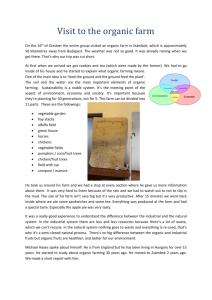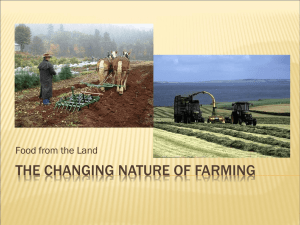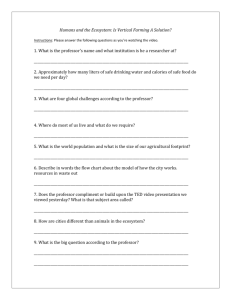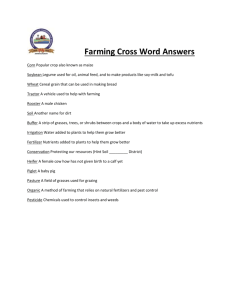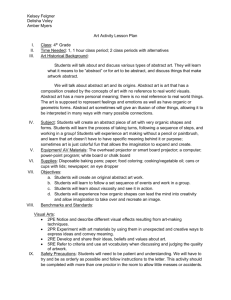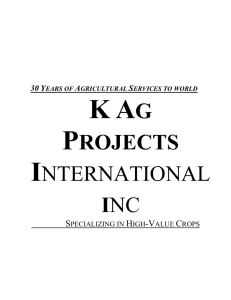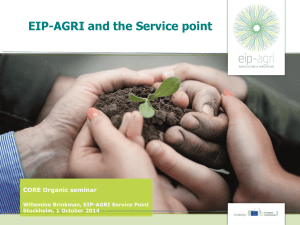proven farm
advertisement
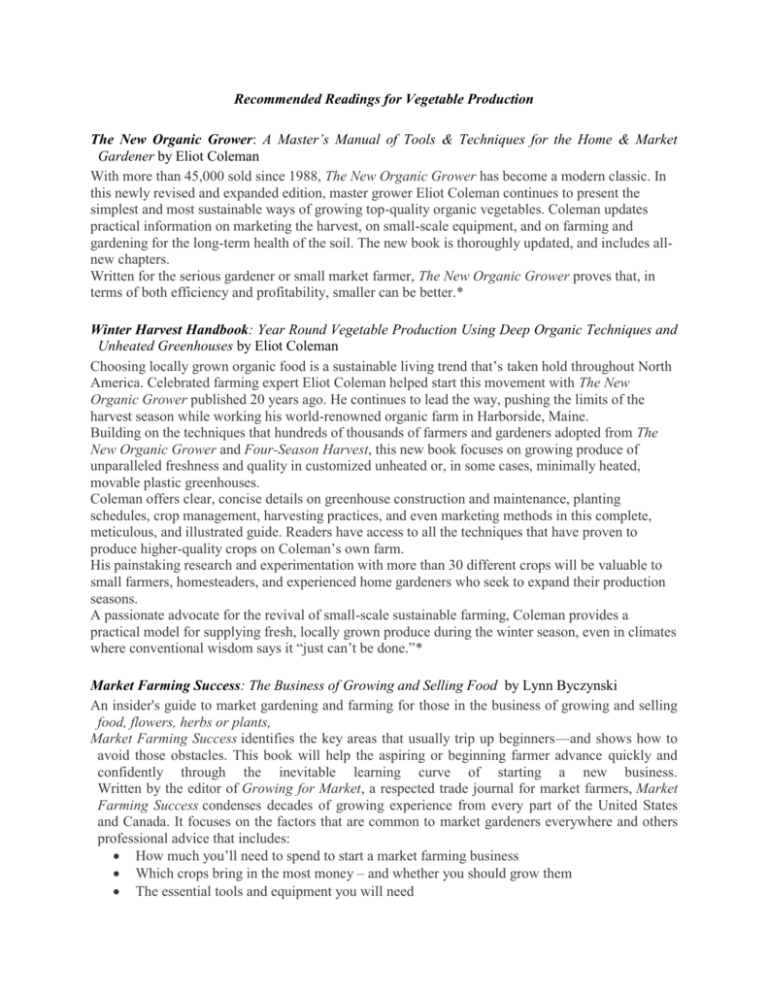
Recommended Readings for Vegetable Production The New Organic Grower: A Master’s Manual of Tools & Techniques for the Home & Market Gardener by Eliot Coleman With more than 45,000 sold since 1988, The New Organic Grower has become a modern classic. In this newly revised and expanded edition, master grower Eliot Coleman continues to present the simplest and most sustainable ways of growing top-quality organic vegetables. Coleman updates practical information on marketing the harvest, on small-scale equipment, and on farming and gardening for the long-term health of the soil. The new book is thoroughly updated, and includes allnew chapters. Written for the serious gardener or small market farmer, The New Organic Grower proves that, in terms of both efficiency and profitability, smaller can be better.* Winter Harvest Handbook: Year Round Vegetable Production Using Deep Organic Techniques and Unheated Greenhouses by Eliot Coleman Choosing locally grown organic food is a sustainable living trend that’s taken hold throughout North America. Celebrated farming expert Eliot Coleman helped start this movement with The New Organic Grower published 20 years ago. He continues to lead the way, pushing the limits of the harvest season while working his world-renowned organic farm in Harborside, Maine. Building on the techniques that hundreds of thousands of farmers and gardeners adopted from The New Organic Grower and Four-Season Harvest, this new book focuses on growing produce of unparalleled freshness and quality in customized unheated or, in some cases, minimally heated, movable plastic greenhouses. Coleman offers clear, concise details on greenhouse construction and maintenance, planting schedules, crop management, harvesting practices, and even marketing methods in this complete, meticulous, and illustrated guide. Readers have access to all the techniques that have proven to produce higher-quality crops on Coleman’s own farm. His painstaking research and experimentation with more than 30 different crops will be valuable to small farmers, homesteaders, and experienced home gardeners who seek to expand their production seasons. A passionate advocate for the revival of small-scale sustainable farming, Coleman provides a practical model for supplying fresh, locally grown produce during the winter season, even in climates where conventional wisdom says it “just can’t be done.”* Market Farming Success: The Business of Growing and Selling Food by Lynn Byczynski An insider's guide to market gardening and farming for those in the business of growing and selling food, flowers, herbs or plants, Market Farming Success identifies the key areas that usually trip up beginners—and shows how to avoid those obstacles. This book will help the aspiring or beginning farmer advance quickly and confidently through the inevitable learning curve of starting a new business. Written by the editor of Growing for Market, a respected trade journal for market farmers, Market Farming Success condenses decades of growing experience from every part of the United States and Canada. It focuses on the factors that are common to market gardeners everywhere and others professional advice that includes: How much you’ll need to spend to start a market farming business Which crops bring in the most money – and whether you should grow them The essential tools and equipment you will need The best places to sell your products How to keep records to maximize profits and minimize taxes Tricks of the trade that will make you more efficient in the greenhouse, field, and market.* Sustainable Market Farming: Intensive Vegetable Production on a Few Acres by Pam Dawling Across North America, an agricultural renaissance is unfolding. A growing number of market gardeners are emerging to feed our appetite for organic, regional produce. But most of the available resources on food production are aimed at the backyard or hobby gardener who wants to supplement their family's diet with a few homegrown fruits and vegetables. Targeted at serious growers in every climate zone, Sustainable Market Farming is a comprehensive manual for small-scale farmers raising organic crops sustainably on a few acres. Informed by the author's extensive experience growing a wide variety of fresh, organic vegetables and fruit to feed the approximately one hundred members of Twin Oaks Community in central Virginia, this practical guide provides: Detailed profiles of a full range of crops, addressing sowing, cultivation, rotation, succession, common pests and diseases, and harvest and storage Information about new, efficient techniques, season extension, and disease resistant varieties Farm-specific business skills to help ensure a successful, profitable enterprise Whether you are a beginning market grower or an established enterprise seeking to improve your skills, Sustainable Market Farming is an invaluable resource and a timely book for the maturing local agriculture movement.* The Market Gardener: A Successful Grower’s Handbook for Small-Scale Organic Farming by JeanMartin Fortier Les Jardins de la Grelinette is a micro-farm located in eastern Quebec, just north of the American border. Growing on just 1.5 acres, owners Jean-Martin and Maude-Helène feed more than two hundred families through their thriving CSA and seasonal market stands and supply their signature mesclun salad mix to dozens of local establishments. The secret of their success is the low-tech, high-yield production methods they’ve developed by focusing on growing better rather than growing bigger, making their operation more lucrative and viable in the process. The Market Gardener is a compendium of la Grelinette’s proven horticultural techniques and innovative growing methods. This complete guide is packed with practical information on: Setting-up a micro-farm by designing biologically intensive cropping systems, all with negligible capital outlay Farming without a tractor and minimizing fossil fuel inputs through the use of the best hand tools, appropriate machinery, and minimum tillage practices Growing mixed vegetables systematically with attention to weed and pest management, crop yields, harvest periods, and pricing approaches Inspired by the French intensive tradition of maraichage and by iconic American vegetable grower Eliot Coleman, author and farmer Jean-Martin shows by example how to start a market garden and make it both very productive and profitable. Making a living wage farming without big capital outlay or acreages may be closer than you think.* Sustainable Vegetable Production from Start-Up to Market by Vern Grubinger. Plan and manage profitable and environmentally friendly vegetable production. Addresses the principles and practices essential to planning, launching, and managing a vegetable production business and the practical implications of sustainability. Thirty-two profiles detail the experiences of individual vegetable growers and provide enterprise budgets for a number of crops. Includes 91 illustrations, 36 sidebars, 20 tables, 6 appendices, a glossary, and extensive references.* “This is an excellent overview of vegetable farming, with more of an emphasis on larger-scale production than The New Organic Grower. It covers all aspects of market farming, from planning to marketing, and does a great job of helping the small grower understand what is required to expand. The sections on equipment are particularly useful to new growers.” (Lynn Byczynski) Knott’s Handbook for Vegetable Growers by Donald J. Maynard and George J. Hochmuth The leading one-stop reference for commercial vegetable growers for more than 50 years Rooted in tradition, branching out to the future. For more than half a century, Knott's Handbook for Vegetable Growers has provided generations of commercial growers with the most timely, accessible, and useful information available on the subject. The Fifth Edition of this highly regarded horticultural mainstay provides readers with the reliable growing and marketing information they've come to expect, while including new and updated material throughout to maintain its relevance in our everchanging world. Filled with valuable information, largely in the form of tables and charts--from hard statistics on vegetable production and consumption to essential information for today's international markets, such as vegetable botanical names and vegetable names in nine languages-Knott's Handbook is part Farmer's Almanac, part encyclopedia, and part dictionary. It also provides detailed, practical specifics on planting rates, schedules, and spacing; soils and fertilizers; methods for managing crop pests; greenhouse vegetable and crop production; insect pest identification; harvesting and storage; and vegetable marketing. Now available in a new flexible cover designed for ease of use on the desk or in the field, this valuable workhorse features new information on: World vegetable production, Best management practices, Organic crop production, Food safety, Pesticide safety, Postharvest problems, Minimally processed vegetables* The Organic Farmer’s Business Handbook: A Complete Guide to Managing Finances, Crops, and Staff – and Making a Profit by Richard Wiswall Contrary to popular belief, a good living can be made on an organic farm. What’s required is farming smarter, not harder. In The Organic Farmer’s Business Handbook, Richard Wiswall shares advice on how to make your vegetable production more efficient, better manage your employees and finances, and turn a profit. From his twenty-seven years of experience at Cate Farm in Vermont, Wiswall knows firsthand the joys of starting and operating an organic farm—as well as the challenges of making a living from one. Farming offers fundamental satisfaction from producing food, working outdoors, being one’s own boss, and working intimately with nature. But, unfortunately, many farmers avoid learning about the businessend of farming; because of this, they often work harder than they need to, or quit farming altogether because of frustrating—and often avoidable—losses. In this comprehensive business kit, Wiswall covers: Step-by-step procedures to make your crop production more efficient Advice on managing employees, farm operations, and office systems Novel marketing strategies What to do with your profits: business spending, investing, and planning for retirement A companion CD offers valuable business tools, including easy-to-use spreadsheets for projecting cash flow, a payroll calculator, comprehensive crop budgets for forty different crops, and tax planners.* Small Farm Equipment by Jon Magee. This book covers many facets of equipment use and maintenance on the small to mid-size farm. Mechanical concepts and terminology Best practices and safety around the farm Tools for maintenance Tips for shop work Regular maintenance tasks Troubleshooting start-up problems Common small equipment Tractor operation and safety The book is written to be accessible and straight forward – detailed, yet broad enough for the variety of skills needed on the diversified farm. Clear illustrations of tools, parts, and equipment are provided throughout the text.* *description taken from Amazon
